|
Гипермаркет знаний>>Английский язык>>Английский язык 11 класс>> Module 4 Danger

Danger!
Before you start ...
• Do you know your rights?
• What do you think are the most important laws a country should have?
Look at Module 4
Find the page numbers for pictures 1 -4.
Find the page numbers for
• a joke
• a dialogue
• a biography
• a sketch
Listen, read and talk about...
• health
• accidents & emergencies
• illnesses & injuries
• visiting the doctor
• The Adventures of Tom Sawyer by Mark Twain
• an amazing rescue
• water pollution
Learn how to ...
• offer help
• accept or refuse help
• speculate & respond to speculation
Practise ...
• the passive
• the causative
• make/ get/ have
• phrasal verbs: go
• prepositional phrases related to health
• idioms related to health
• verbs for ways of moving
• narrative techniques
Write / Make ...
• a paragraph describing a dangerous journey
• a diary entry as a character in a story
• a story
• a project about a person who has helped improve conditions
• a diary entry about the Great Fire of London
• a two-minute talk about water pollution
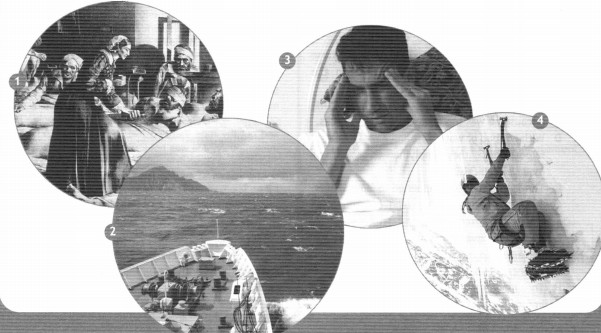
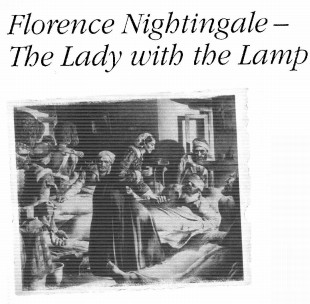
Barrack Hospital, Scutari 14th November, 1854
Not a sponge, nor a rag of linen, not anything I have left. Everything is gone to make pillows and shirts. These poor /ellows have not had a clean shirt nor been washed for two months before they came here, and the state in which they arrive from, the transport is literally crawling. I hope in a few days we shall establish a little cleanliness. But we have not a basin, nor a towel, nor a bit of soap, nor a broom - I have ordered 300 scrubbing brushes. But one hal/o/the barrack is so out of repair that it is impossible to use a drop of water on the stone floors, which are laid on rotten wood, and would give our men fever in no time.
1 a Look at the picture of Florence Nightingale and read the letter she wrote. What was this woman's profession and what is she describing?
b Why do you think Florence was called 'The Lady With the Lamp'? Read the main text to check.
c Explain the meaning of the underlined words. Use a dictionary.
2 RNE Read the text again carefully, then complete the gaps (1-10) with derivatives of the words in brackets.
3 Read and listen to the text again. Make notes under the headings, then talk about Florence Nightingale.
• place/date of birth
• early years • later years
• achievements • date of death
THINK! How important was Florence Nightningale's work? In three minutes write a few sentences on the topic.
4 Portfolio: In groups, find information about a person who has helped improve conditions in your country for the school magazine.

Florence Nightingale was born in 1820 to a rich family. Her parents expected her to marry and have a family. But Florence did not want a 1) .........(mean) life. She wanted to help the sick and the poor. 2)............(event), she persuaded her father to let her become a nurse.
In i854, England, France and Turkey went to war against Russia (the Crimean War). Reports began to reach England of the 3).............. (terror) conditions soldiers were suffering in the army hospitals. Florence volunteered to go and help. When she arrived, she found thousands of ill and wounded soldiers living in filthy conditions.
The hospitals were 4).....(crowd) and unventilated. Soldiers lay without proper food, bedding and 5).........(cloth). There was a lack of basic medical supplies like bandages and medicine. Rats and sewage filled the hospital corridors. Soldiers were dying in the thousands, not from their wounds but from the unsanitary conditions. Florence cleaned up the hospital, made sure the men were fed 6).........(proper), and saw that supplies were available. She worked almost around the clock looking after the soldiers.
Florence soon became known as 'the Lady with the Lamp' for her 7).........(dedicate) to caring for her patients. News of her hard work in Crimea filtered back to London. She became a celebrity. By the time she arrived back in London, she was the most 8).........(fame) person in Britain after Queen Victoria.
After the war, Florence continued to work to improve conditions in hospitals. She even established a school for nursing and wrote an 9).......(influence) book on the profession. She also became an important 10)............ (consult) on health issues. In fact, it was her work after the war that changed medical care forever.
In her later years, Florence suffered from ill health. She died in 1910, at the age of ninety.
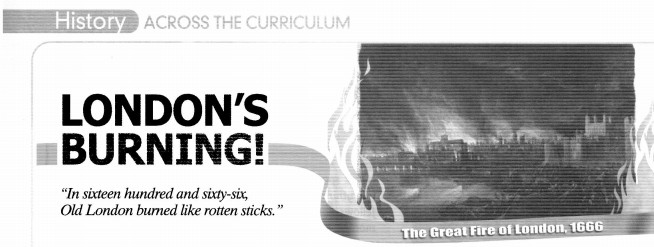
In 1666, London was a city just waiting to burn. Narrow streets were overcrowded with buildings. Open fires and candles burned inside homes and businesses. A long, hot summer had just 1)............ to an end, and the wood-built city was bone dry. On the evening of Saturday, 1 st September, Thomas Farynor, baker to King Charles II, went to bed without properly putting out the fire in one of his ovens. Sometime after 1:00 am on Sunday morning, a spark from the fire's embers ignited some straw on the bakery floor. Flames quickly engulfed the house in Pudding Lane. Neighbours attempted to put out the fire, but the flames were 2)...........fierce. The fire began to spread.
At 4:00 am London's mayor, Sir Thomas Bloodworth, was woken up. He was advised to have all the neighbouring houses demolished, as this would stop the fire spreading, but the Mayor refused to give the order. He paid 3)........for this decision. By early morning, three hundred houses were on fire and winds from the east were causing the fire to spread with frightening speed.
4)..........the next three days and nights, the fire raged out of control. It took until the evening of Wednesday, 5th September, when the 5)...........winds finally died down, to bring the fire under control.
When the fire was totally extinguished on Thursday, 6th September, five-sixths of the heart of the city had been destroyed. Over 13,000 houses, 87 churches and 4 bridges, 6).........with many important buildings, such as St Paul's Cathedral, were gone. Astonishingly, however, it is thought that fewer than ten people died in the blaze!
If you visit London today, you can see a tall column - called The Monument - commemorating the Great Fire. It stands at 220 feet tall - the distance from its location to the site of Thomas Farynor's bakery - so if it fell over in the right direction, it would 7)...........to the exact spot where the fire started!
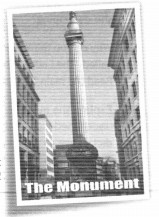
1 a Look at the picture and listen to the rhyme. What do they tell us about the Great Fire of London?
b How do you think the fire started and why did it spread so quickly? Read the first paragraph of the text to find out.
2 RNE Read the text, then choose the best word (A, B, C or D) for each gap (1-7).
A come B turned C reached D brought
A more B too C a lot D very
A greatly B badly C highly D dearly
A In B Until C Over D Across
A heavy B big C strong D hard
A plus B up C added D along
A arrYve B show C piont D direct
3 Listen and read the text again. Explain the meaning of the words in bold. Use a dictionary.
4 Use the text to write a timeline of the main *? events during the Great Fire of London. Use your timeline to give the class a summary of what happened.
> Saturday. 1st September (evening): Thomas Farynor (baker) forgot to put out the fire in one of his ovens.
5 Portfolio: Imagine you lived in London in 1666. Write your diary entries for the days of
the fire.
1 Look at the picture. What does it show? In what different ways do we pollute our water? Read the labels and check.
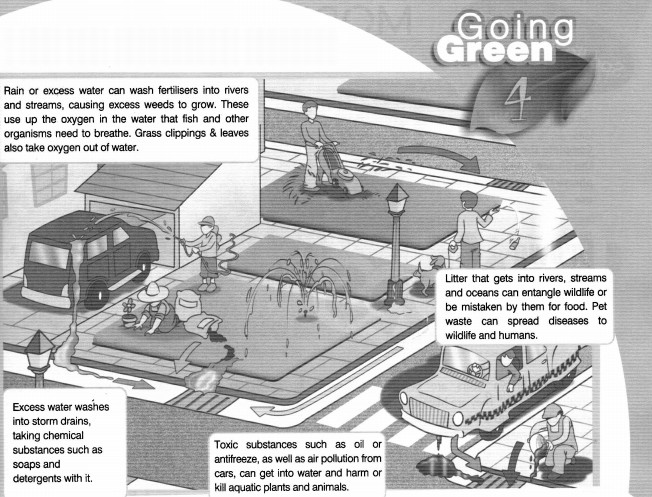
2 Suggest ways that we can minimise water pollution. C > Listen, read and check. Then explain the words in bold.
Clean water is our most precious resource, yet every day we dump about two million tons of waste into the world's rivers, lakes and streams. This not only spells bad news for the animals and plants that live in them, but can also make humans ill when the pollution floats down into the oceans that we swim in! There are several things we can do to restore our sick waterways back to health. First things first, make sure you NEVER throw anything that could be toxic down a drain or onto soil. Then, make sure that no litter, grass dippings or leaves are allowed to get washed into storm drains, as they could end up seriously harming aquatic creatures. Next, dean up after your dog!
Another way to reduce water pollution is to reduce excess water runoff. You can do this by making sure that your sprinkler is watering just your garden, not the pavement too! You can also try sweeping, not hosing, your paths and cleaning your car with a bucket of water instead of a hosepipe. Better still, take it to be cleaned in a car wash, as they know how to dispose of waste water properly. Finally, try to use products that aren't harmful to the environment, such as compost instead of chemical fertilisers.
Basically, remember that anything that gets onto the ground can eventually end up in a river, lake or stream! So, make sure you do not allow any chemicals or waste to go on the ground or down the drain.
3 Portfolio: Use the picture and the text to give a two-minute talk about water pollution. In the talk:
• explain why water pollution is a problem
• give some examples of ways that water is polluted
• explain how your audience can reduce water pollution
4 THINK!Do you agree with the statement? Discuss.
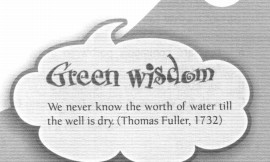
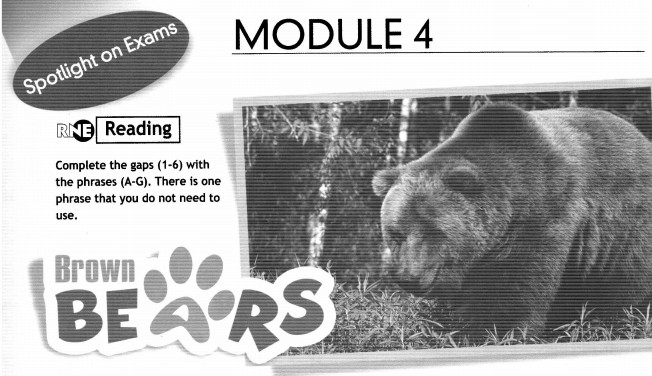
Indeed, brown bears are beautiful, powerful creatures 1)...........They are huge animals which have sharp claws up to 15 cm in length, and weigh up to 700 kg.
Contrary to popular belief, up to 90% of a brown bear's food is made up of vegetable matter, such as berries, roots and fungi. However, they also eat fish, insects, mammals such as squirrels and deer, and an enormous amount of moths in the summer, 2)......... However, bears are not always the cuddly animals 3)............
People often don't realise just how dangerous brown bears can be. It is not unusual to see tourists in Russia walking along paths 4) .............
Sometimes, too, villagers go out to gather berries from bushes which are within a few metres of a bear's territory.
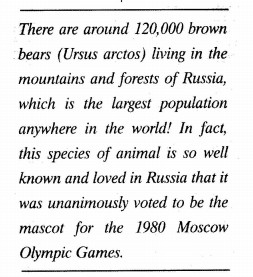
Whilst it is relatively rare for bears to attack humans, they still kill ten people per year on average in Russia. Attacks only usually happen, however, either because a bear is injured or when a human encounters a mother bear with its cubs. They are also more common in years 5).............At these times they are forced to come into human settlements to find food.
The population of the brown bear has declined drastically in recent years because of poaching for skins and fat. Every year, more than 5,000 are hunted in Russia for their furs. Many are also killed There are around 120,000 brown bears (Ursus arctos) living in the mountains and forests of Russia, which is the largest population anywhere in the world! In fact, this species of animal is so well known and loved in Russia that it was unanimously voted to be the mascot for the 1980 Moscow Olympic Games. by hunters 6)............
The Russian government is considering new laws that would ban the shooting of . .. brown bears in the winter, as in some areas they are already extinct.
A that are commonly portrayed in cartoons and fairy tales
B sometimes as many as 40,000 in a day
C with fur varying in colour from cream to almost black
D because they are mostly solitary creatures
E when there is a shortage of food in the wild
F that bears commonly use
G who pay a lot of money to shoot brown bears for trophies
Listen and choose A, B or C for statements 1-7.
1 Megan tried to give up smoking two weeks ago.
A True B False C Not stated
2 Megan has tried two different therapies so far.
A True B False C Not stated
3 Jim started smoking because of stress.
A True B False C Not stated
4 Jim hasn't smoked for two years.
A True B False C Not stated
5 Jim stopped smoking because someone threatened him.
A True B False C Not stated
6 Jim still felt like smoking after his first session with the acupuncturist.
A True B False C Not stated
7 In the end, Megan agrees to try the acupuncturist.
A True B False C Not stated
RNE Speaking
Give a two-minute talk on the medical profession.
Remember to say:
• which jobs in medical profession you consider to be the most important and why (e.g/ doctors, surgeons, ambulance drivers).
• what the advantages and disadvantages of working in this profession are.
• if you would consider working in the medical profession and why/why not.
• what medical care is like in your country.
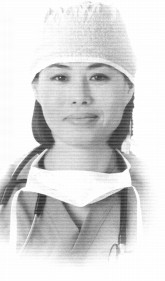
Choose the best word (A, B, C or D) for each gap (1-7).
It was the sound of the car brakes 1)............that caught her attention first of all. The noise stood out from all the other noises that crowded into her ears - the car horns hooting, the sound of children's voices as they ran out of the school playground, mothers calling their children, 2).......... to get them home.
Then, it felt as if someone had placed their hands on her and forcibly made her turn around and look. As soon as she did, her eyes 3).......... and her hands began to shake. Her legs seemed frozen to the 4)..........All she could do was watch 5)...........immobile, as if it was all happening in slow motion, right there in front of her.
She opened her mouth, but no sound came 6).............Then came the dull thud as the car hit the child, the shocked gasps of the 7)..........and the roaring of the car as it sped away.
1 A shrieking C screaming
B screeching D shouting
2 A restless C impatient
B nervous D worried
3 A opened C broadened
B enlarged D widened
4 A point C spot
B place D mark
5 A helplessly C pointlessly
B uselessly D worthlessly
6 A out C about
B through D away
7 A viewers C audience
B spectators D onlookers
RNE Writing
Comment on the following statement:
Many people think that medical care should be free and available to all, whereas others believe that we should have to pay for the medical services we use.
What is your opinion? Should we have to pay for medical care, or should it be free? Write 120-180 words using the plan.
Para 1: Introduction (state the problem)
Para 2: Express your opinion and give reasons for it
Para 3: Give arguments for the other point of view and explain why you don't agree with
Para 4: Draw a conclusion
1 Fill in: peak, agonising, miraculously, crippled, bruised, stiff, streaming, rash, allergic, internal
1 Tom was battered and..........., but alive.
2 I think I must be.......to something because my nose is running and my eyes are watery.
3 ......... the mountaineers made it safely off the mountain after the blizzard.
4 Jane sat in a draught, so she has a............neck.
5 Henry felt fantastic when he reached the ..............of the mountain.
6 Fortunately, Kate had no............ bleeding after her fall.
7 The pain in his arm was ..............
8 Oh dear! I've got a...............cold. Atishoo!
9 He was................. by the fall because both his legs were broken.
10 What is that strange.............all over your body? You should go to the doctor.

2 Fill in the gaps with the correct passive form of the verbs in brackets.
1 The wound must..............(clean) before you put a plaster on it.
2 The Adventures of Tom Sawyer............(write)
by Mark Twain.
3 Jane.............(see) by the doctor right now.
4 Luckily, the driver of the car ..............
(not/injure) in the accident.
5 One day a cure..............(find) for cancer.

3 Complete the sentences using the words in bold. Use two to five words.
1 The surgeon will do the operation tomorrow.
be The operation..........tomorrow
2 The dentist cleaned her teeth.
had She............by the dentist.
3 They have built a brand new hospital in our town
been A brand new hospital ............in our
town.
4 There are reports that 10 people died in the crash
have Ten people are............in the crash.
5 She insisted that they go to the hospital.
made She...............to the hospital.

4 Complete the phrasal verbs with the correct T particle.
1 I don't want to go................what my operation is for!
2 Tom wants to go ..........with the plastic surgery.
3 If you go..............smoking, you will damage your health.
4 Why won't this toothache go .....?
5 I don't want to go................pain like that again.

5 Fill in the gaps with the correct preposition.
1 Jane recovered............her illness very quickly.
2 How long has Tim been complaining ................headaches?
3 Kim is allergic.............nuts.
4 Paul was treated ...............back pain by a chiropractor.
5 Tony was involved..............a terrible accident.

6 Match to form exchanges.
1 You've probably got a I hope not! an infection. a I hope not!
2 You'll feel better in a b Would you?
few days. Thanks!
c Don't worry. I'll
3 It could be chickenpox. be fine!
4 Can I make you a hot d You could be right. drink? e I hope so.
5 Sorry you're not well.

Now I Can ....
• talk about health, accidents & emergencies, illnesses & injuries
• talk and write about water pollution
• offer help and accept or refuse help
• speculate & respond to speculation

Английский язык. 11 класс : учеб. для общеобразоват. учреждений / [О.В. Афанасьева, Дж.Дули, И.В. Михеева и др.]. - 2-е изд., доп. и перераб. - М.: Express Publishing : Просвещение, 2009. - 244 с. : ил. - (Английский в фокусе).
Английский язык за 11 класс бесплатно скачать, планы конспектов уроков, готовимся к школе онлайн
Содержание урока
 конспект урока конспект урока
 опорный каркас опорный каркас
 презентация урока презентация урока
 акселеративные методы акселеративные методы
 интерактивные технологии
Практика интерактивные технологии
Практика
 задачи и упражнения задачи и упражнения
 самопроверка самопроверка
 практикумы, тренинги, кейсы, квесты практикумы, тренинги, кейсы, квесты
 домашние задания домашние задания
 дискуссионные вопросы дискуссионные вопросы
 риторические вопросы от учеников
Иллюстрации риторические вопросы от учеников
Иллюстрации
 аудио-, видеоклипы и мультимедиа аудио-, видеоклипы и мультимедиа
 фотографии, картинки фотографии, картинки
 графики, таблицы, схемы графики, таблицы, схемы
 юмор, анекдоты, приколы, комиксы юмор, анекдоты, приколы, комиксы
 притчи, поговорки, кроссворды, цитаты
Дополнения притчи, поговорки, кроссворды, цитаты
Дополнения
 рефераты рефераты
 статьи статьи
 фишки для любознательных фишки для любознательных
 шпаргалки шпаргалки
 учебники основные и дополнительные учебники основные и дополнительные
 словарь терминов словарь терминов
 прочие
Совершенствование учебников и уроков прочие
Совершенствование учебников и уроков
 исправление ошибок в учебнике исправление ошибок в учебнике
 обновление фрагмента в учебнике обновление фрагмента в учебнике
 элементы новаторства на уроке элементы новаторства на уроке
 замена устаревших знаний новыми
Только для учителей замена устаревших знаний новыми
Только для учителей
 идеальные уроки идеальные уроки
 календарный план на год календарный план на год
 методические рекомендации методические рекомендации
 программы программы
 обсуждения
Интегрированные уроки обсуждения
Интегрированные уроки
Если у вас есть исправления или предложения к данному уроку, напишите нам.
Если вы хотите увидеть другие корректировки и пожелания к урокам, смотрите здесь - Образовательный форум.
|




























